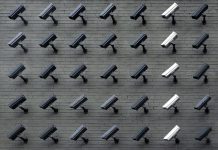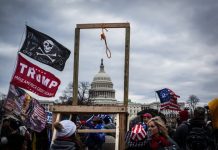Could things get any more Orwellian?
First former press secretary Sean Spicer told us Donald Trump’s inauguration produced “the largest audience ever to witness an inauguration,” in spite of facts proving the contrary.
Then came the attacks on the “fake news.”
Next, a ban on seven terms the Centers for Disease Control and Prevention (CDC) prohibited from this year’s budget.
Last week, Trump said:
“What you’re seeing and what you’re reading is not what’s happening.”
Now we learn of a clandestine surveillance program out of the Transportation Security Administration (TSA) that would make George Orwell loom down at us from beyond the grave and shout, “I told you so!”
It’s called “Quiet Skies,” and it has already been in practice since March, although the Washington Post reports it has been active since 2010.
If you have traveled on commercial airlines since then, scanned your boarding pass from a distance, had a “cold, penetrating stare,” fell asleep on a plane, talked to other passengers, or used a restroom, chances are an air marshal was watching you and took note.
But you might be saying to yourself, “I’m not on any terror watch list. I sail right through airport security.”
Well, according to a March TSA bulletin, Quiet Skies pinpoints travelers who “are not under investigation by any agency and are not in the Terrorist Screening Data Base.”
That bulletin describes Quiet Skies’ goal as eliminating threats to commercial aircraft “posed by unknown or partially known terrorists.”
Since the program was launched, air marshals have followed travelers whom some argue pose no threat, like a Southwest Airlines flight attendant, and a federal law enforcement officer.
It is because of this many feel Quiet Skies is unnecessarily expensive and time consuming.
TSA spokesman, James Gregory, refused to disclose whether Quiet Skies has successfully thwarted any threats, or confirm the program exists, claiming doing so “would make passengers less safe.”
In an emailed statement, he said:
“FAMs [federal air marshals] may deploy on flights in furtherance of the TSA mission to ensure the safety and security of passengers, crewmembers, and aircraft throughout the aviation sector. As its assessment capabilities continue to enhance, FAMS leverages multiple internal and external intelligence sources in its deployment strategy.”
Government documents reveal TSA’s battalion of armed, undercover air marshals monitoring 40 to 50 passengers on domestic flights each day, of which about 35 who fidget, use computers, or have “jumps” in their Adam’s apples are surveilled.
TSA assistant administrator of public affairs, Michael Bilello, disputes the charge that Quiet Skies surveilles “ordinary Americans.”
He said:
“These programs are not designed to observe the average American. They’re designed to protect the traveling public, but they’re not targeting the average American. We’re talking about a very unique passenger that warrants the attention of a federal air marshal.”
All U.S. citizens entering the country are automatically included in Quiet Skies screening.
Want to see the “behavior checklist?” Click here.
Hugh Handeyside, senior staff attorney with the American Civil Liberties Union’s (ACLU) National Security Project said about the practice:
“These revelations raise profound concerns about whether TSA is conducting pervasive surveillance of travelers without any suspicion of actual wrongdoing. If TSA is using proxies for race or religion to single out travelers for surveillance, that could violate the travelers’ constitutional rights. These concerns are all the more acute because of TSA’s track record of using unreliable and unscientific techniques to screen and monitor travelers who have done nothing wrong.”
Jonathan Turley, a George Washington University law professor, added:
“If this was about foreign citizens, the government would have considerable power. But if it’s US citizens — US citizens don’t lose their rights simply because they are in an airplane at 30,000 feet. There may be indeed constitutional issues here depending on how restrictive or intrusive these measures are.”
John Casaretti, president of the Air Marshal Association, said in a statement opposing Quiet Skies:
“The Air Marshal Association believes that missions based on recognized intelligence, or in support of ongoing federal investigations, is the proper criteria for flight scheduling. Currently the Quiet Skies program does not meet the criteria we find acceptable. The American public would be better served if these [air marshals] were instead assigned to airport screening and check-in areas so that active shooter events can be swiftly ended, and violations of federal crimes can be properly and consistently addressed.”
Have you flown the “quiet skies” recently?
Probably.
Image credit: HotAir




